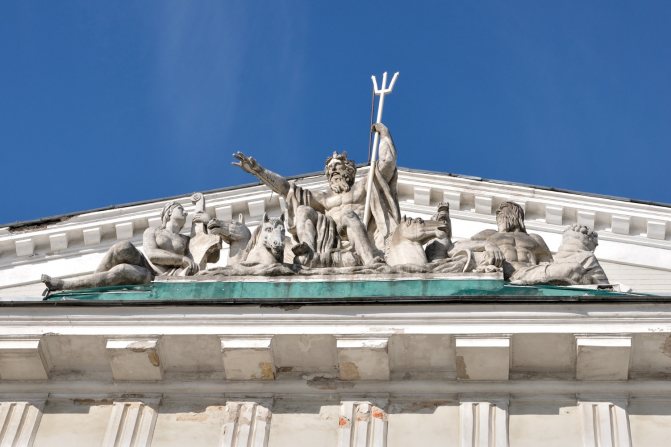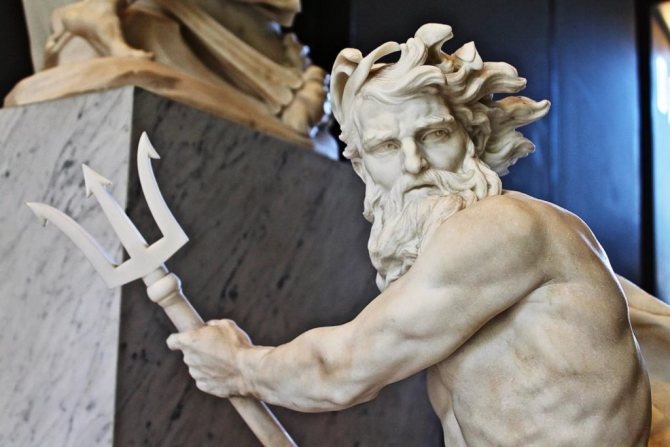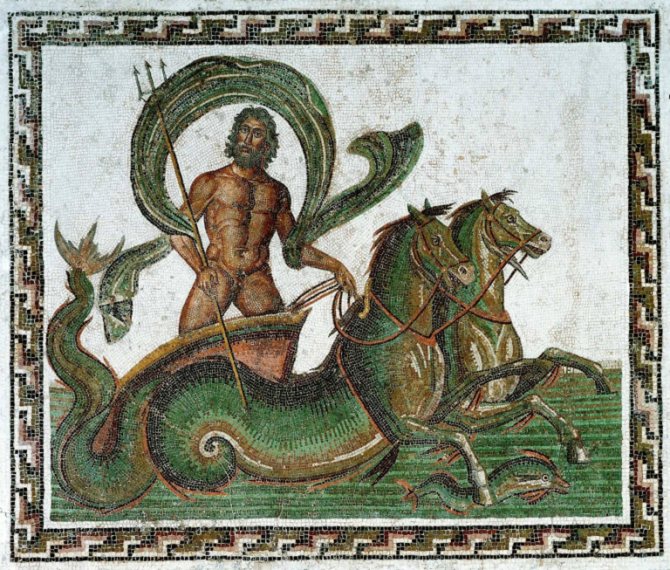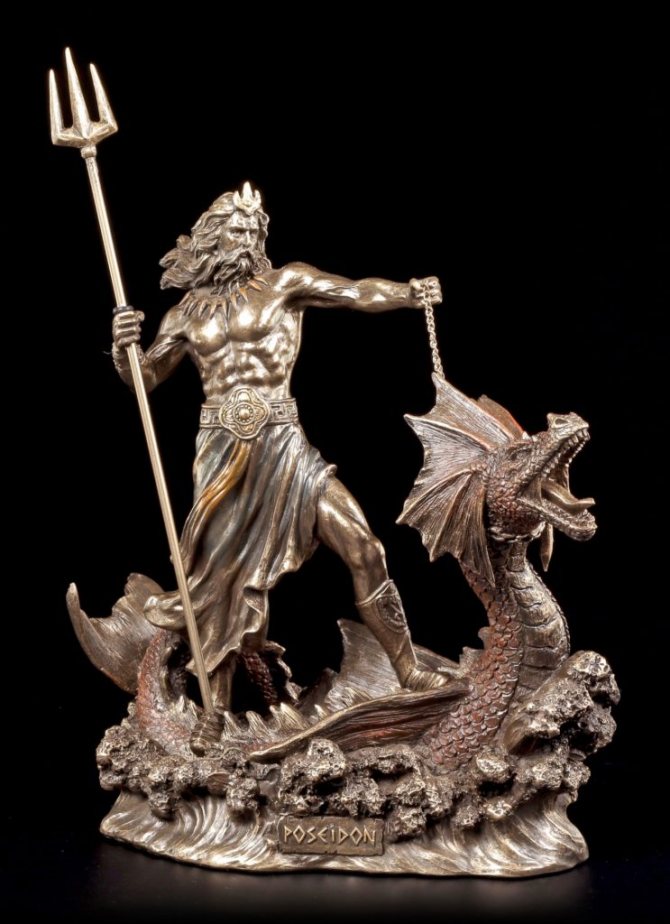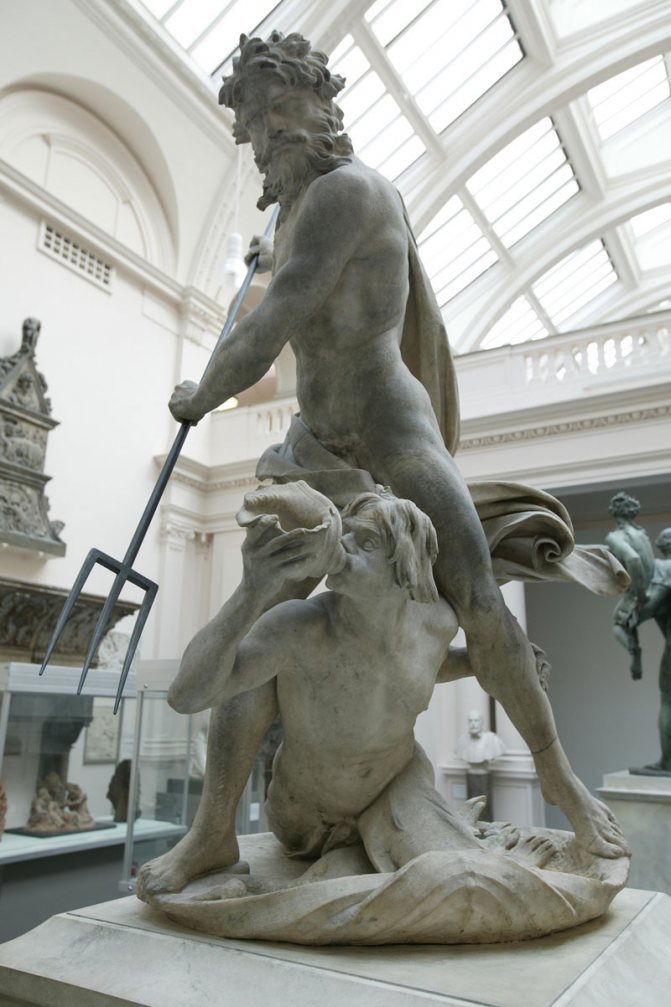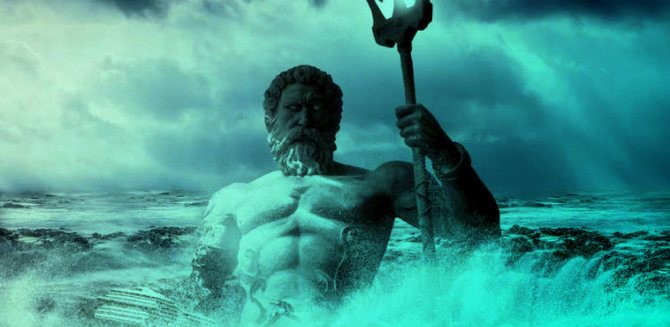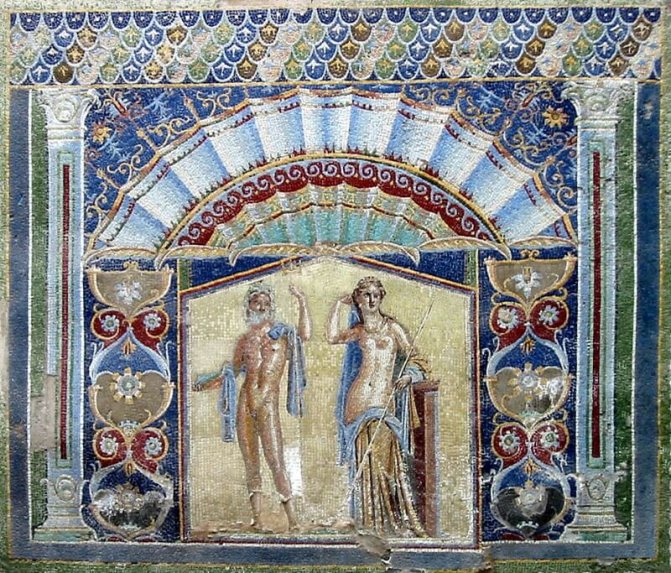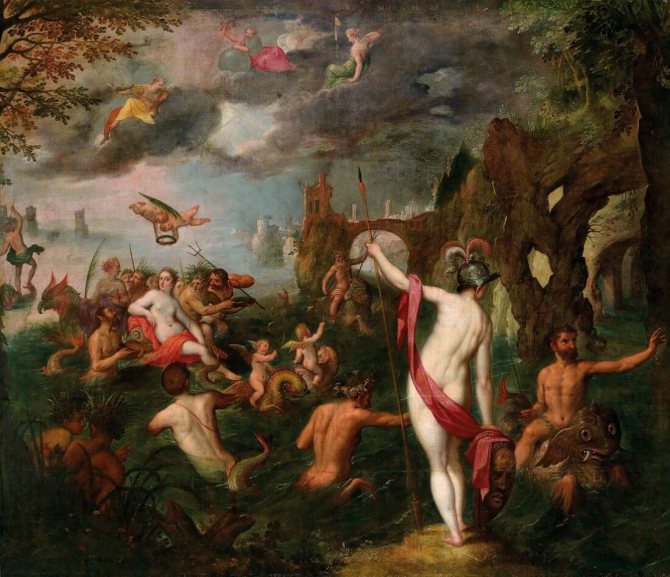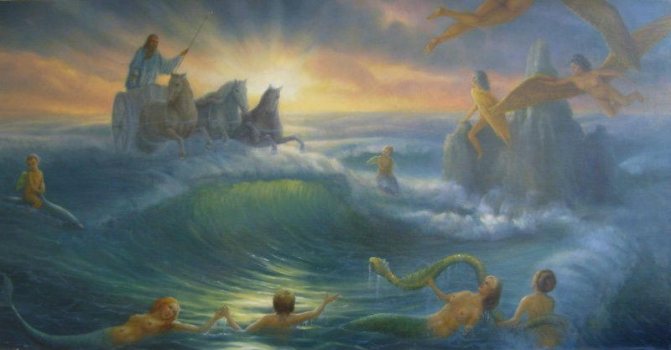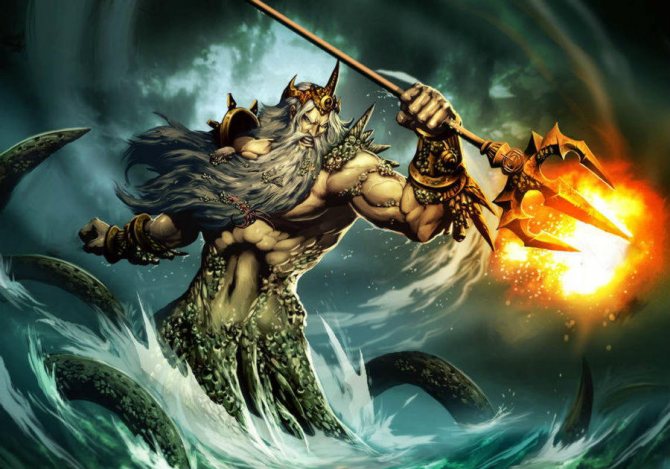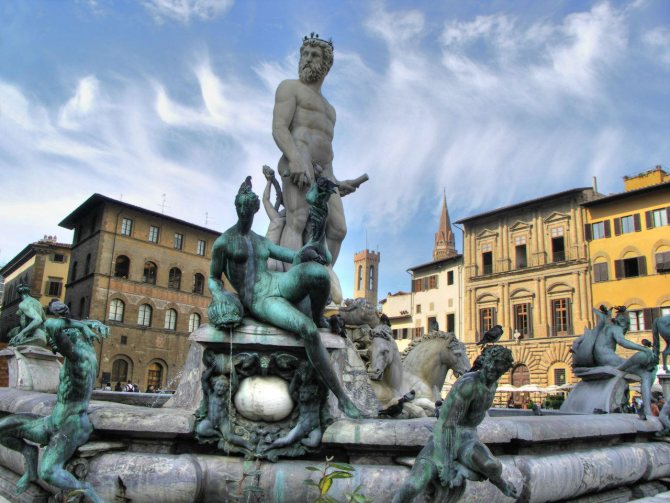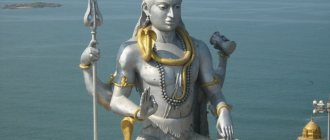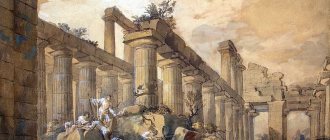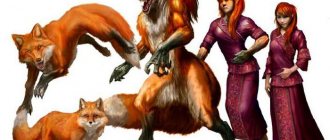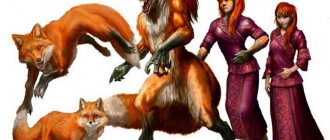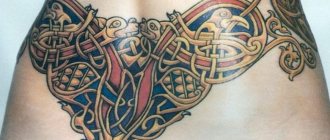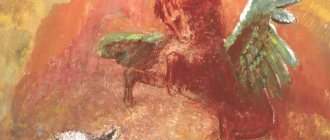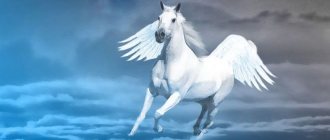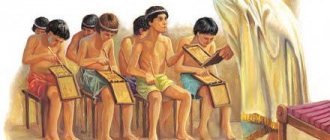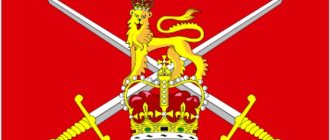Poseidon is one of the major gods in ancient Greece. He was the god of the sea, earthquakes and horses. His father Kronos swallowed him at birth, and it was his brother Zeus who eventually forced his father to spew him out. Poseidon was notorious for his temper, and he also often had intimate relationships with nymphs, goddesses and mortals. As a consequence, he is the father of numerous gods, demigods and other creatures. The trident is the most famous symbol associated with Poseidon and, among other things, can still be seen on the flag of Barbados. Homer's famous epics The Iliad and The Odyssey show Poseidon in an important role, and he is also mentioned in many other works of literature, art, and film. Here are 10 interesting facts about the ancient Greek god Poseidon.
№1. Poseidon was one of the leading deities in ancient Greece.
Poseidon was one of the major deities in all the major historical cities of Greece. In Athens his importance was second only to the goddess Athena. Located in Corinth and in many cities of the region of Greater Greece, he was the most important god. In his mild form the ancient Greeks regarded him as the creator of new islands and the ruler of calm seas. However, when he was offended or ignored, he is believed to have struck the earth with his trident and caused earthquakes, floods, shipwrecks and drownings. He was often mentioned in prayers by sailors who sacrificed horses for this purpose. Even Alexander the Great, who stopped on the shore of the Syrian Sea before the famous battle of Issus, prayed to Poseidon and offered the sea god a chariot with four horses, throwing it into the waves.
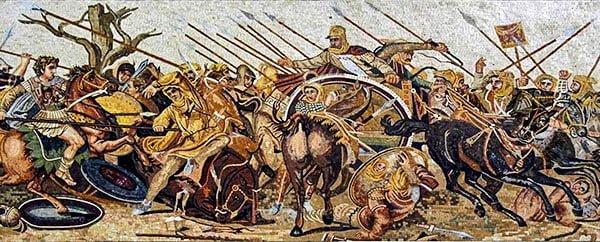
The Battle of Issus
The patron god of Athens
There was once a time in ancient Greece when the first king of Athens, Kekrop, who was half man and half serpent, had to find a patron deity for the city-state of Athens.
Two Olympic gods who were particularly interested in patronage were Poseidon, god of the seas, and Athena, goddess of wisdom and skill. They appeared before Kekropos, and he asked them for a gift of real value to Athens. Poseidon came first: he struck the earth hard and created a well with his trident. Immediately a stream of water gushed forth, but the water turned out to be salty and of little use to the population. Then it was the turn of the goddess Athena. Athena stepped forward, thrust her spear into the ground, then knelt down and planted an olive branch in it. Thus she created an olive tree as a symbol of peace and prosperity on earth. Cecropsus was very impressed with Athena's gift. So he chose Athena to claim the city of Athena, and the city was named after her. The god Poseidon, however, was not pleased with Kekrope's decision and cursed the city of Athens so that there has never been enough water since. It is said that a serious water shortage problem began in Athens after this and continues to this day.
№2. He was swallowed by his father at birth.
Poseidon was the second son of Cronus and Rhea. Cronus overthrew his father Uranus and ruled the world with his wife Rhea. However, he was foretold that one of his children would want to overthrow him as he had overthrown his father. Because of this, he swallowed his children at birth, including Poseidon. Rhea was able to save her sixth child Zeus, and when he came of age, he forced his father to eject his siblings: his sisters Hestia, Demeter, and Hera; and his brothers Hades and Poseidon. Poseidon then joined his other siblings to fight Kronos and the other Titans in the Battle of the Gods, known as Titanomachy. After winning this battle, Poseidon and his brothers divided the world by playing out parties. Poseidon was named lord of the seas, Hades received the underworld, and Zeus received the heavens and became king of the Greek gods.
Poseidon is the god of storms and catastrophes
Not everyone knows that originally Poseidon had nothing to do with the oceans and seas. Myths tell us that before the battle with the titans of his brother Zeus, Poseidon was the patron of earthquakes. I think this phenomenon most accurately describes the character of the god. He is fierce, angry, and impudent, and his behavior is sometimes very unpredictable.
When Zeus was victorious, he and his brothers divided up the parts of the world that each of the gods possessed. And while Hades was given the netherworld, Poseidon was given the sea. True, the god's temper did not change because of the change in activity.
He often strikes the bottom of the ocean with his enormous trident, causing terrible storms. Despite this, it was Poseidon who Greek sailors asked for protection - he was their protector and patron.
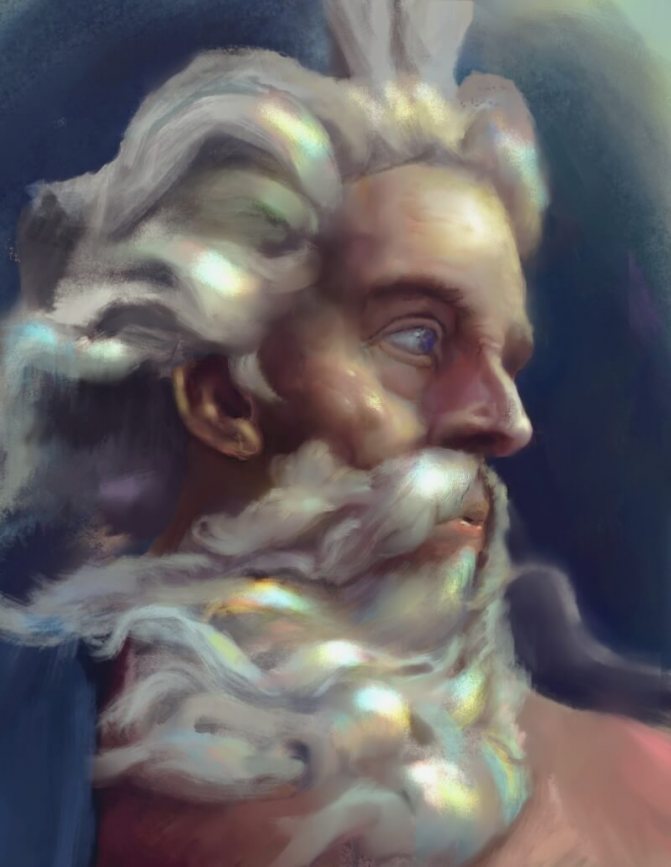

Poseidon was the stern lord of the waters of the sea © Ling Xin / x-done.artstation.com
№3. He was notorious for his aggressive nature.
Although Poseidon is often portrayed as a mature, bearded and wise man, he was notorious for his irritable nature and terrible temper, much like his brothers Zeus and Hades. He was known to create violent storms during fits of extreme loneliness and anger. Poseidon was often the subject of many disputes, quarrels and fights, such as with Athena over the sovereignty of Athens. Nevertheless, there are also some accounts which show that Poseidon matured over the centuries to the point where he was able to control his emotions. However, he loved and cared for his children, giving them advice or helping them on their adventures.
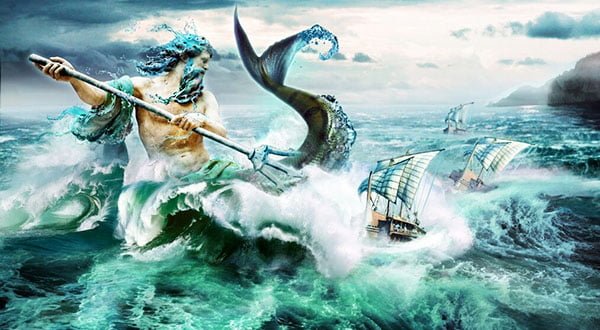

Poseidon in Anger
Poseidon is a god who knows how to wait.
But then what is the secret? Why, with so many faults, is this son of Kronos revered not only among men but also among the gods? It would seem that he should have been put in Tartarus long ago, and the power over the waters returned to the old gods, Nereus and Oceanus. But it's not that simple.
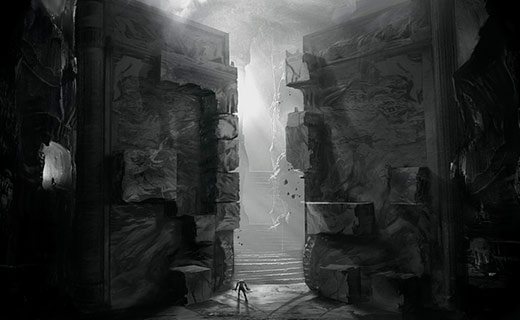

- First of all, Poseidon was Zeus' blood brother, who did not sit out during the mythical war of the gods, the Titanomachy, but participated in the battles in the most meaningful way. Thus it was he who brought down part of the island of Nisyros on the giant Polybot, thus forming the mountainous ridge of Helon, and removing such a formidable foe from the ranks of his enemies.
- Secondly, even before Hephaestus was born, Poseidon was in charge of blacksmithing. For it was he who forged the brass gates of Tartarus, thus locking Python and the defeated old rulers of the world in Hades.
- Thirdly, it was the shaker of the earth who is also called Hypius, that is, "the equestrian." Poseidon gave the world the horse and taught people how to ride. For this merit alone he is worthy of all his altars and altars.
- And fourth, Poseidon is a great diplomat, able to wait, to find allies and compromises. Look how cleverly he enlisted the support of old Nereus by marrying his daughter. And his friendship with the arrowhead Apollo? Together they plotted against Zeus, together they built the walls of Troy. Later, Theseus, son of the god of the sea, worshipped the arrowhead, not unbeknownst to his father, even though Poseidon had an unfinished dispute with the latter over the Oracle of Delphi. So if the situation demands it, Neptune knows how to swallow his pride and choose his friends well. Against this backdrop, his exuberant personality seems a contrived mask that only distracts attention from the strategist's Poseidon. He's already missed his chance to become ruler of the world once, but who knows if fortune will give him a second chance?
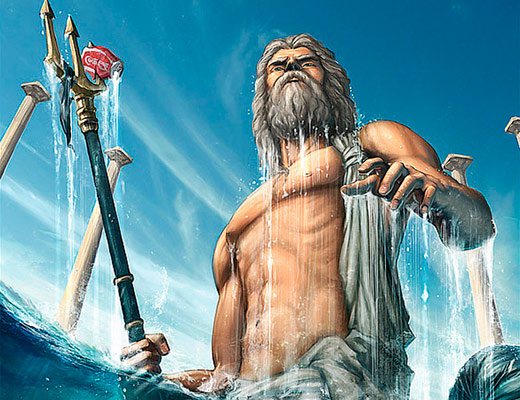

This is where we say goodbye to you. Goodbye and see you soon on the pages of the site "Women's Magic".
Vasiliy Molka.
№4. He was considered the god of horses.
The ancient Greeks closely associated Poseidon with horses. He was believed to have created the first known horse and gave it to people. He also showed people horse and chariot racing. Poseidon was often considered the tamer of horses, but some myths portrayed him as their father. In these myths he mated with a creature who then gave birth to the first horse. Poseidon is often depicted riding over the waves of the sea in a chariot pulled by horses with golden hooves. Poseidon also gave birth to many horses, the most famous of which was the winged horse Pegasus, who was born as a result of his sexual escapades with Medusa. Because of his close association with horses, Poseidon was known as Poseidon Hippios.
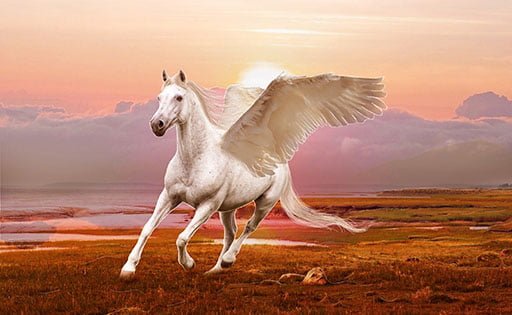

The winged horse is Pegasus, son of Poseidon
The death of Hippolytus
Hippolytus was the son of the hero Theseus and the queen of the Amazons, Antiopa. Hippolytus was a sullen, silent child from birth. His favourite pastime was hunting. Hippolytus did not recognize the power of Aphrodite and offered all sacrifices only to Artemis. The goddess of love was greatly enraged at Hippolytus for this neglect and decided to exact cruel revenge.
Aphrodite instilled in Phaedra, Hippolytus' stepmother, a mad passion for her adopted son. Hippolytus declines Phaedra's love in abhorrence, for which she slanders him before Theseus. The father decided to punish the perfidious son and asked Poseidon (Neptune) to punish Hippolytus. As he rode to the sea in his chariot, the sea god commanded the sea monster to appear on the surface of the waters. The horses spooked and overturned the chariot, and Hippolytus crashed onto the rocks.
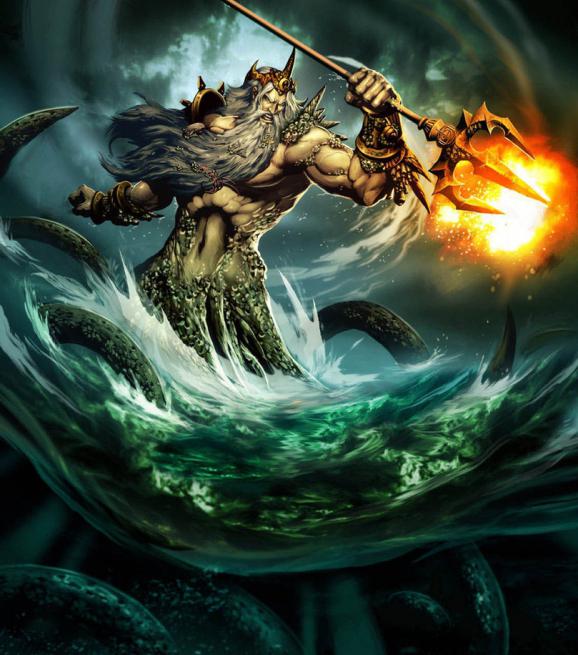

№5. The trident is the main symbol associated with Poseidon.
Poseidon's main weapon is the trident. It was created for him by the three Elder Cyclopes during the Titanomachy. In Greek myths, Poseidon strikes the earth with his trident to create a well of seawater. In one myth he uses it to kill the Giant Polybots during Gigantomachy, the war between the Giants and the gods. He also uses the trident to split rocks, create springs, etc. The trident of Poseidon is believed to resemble the spear of a fish used by the coastal Greeks. To support this theory, it is pointed out that Poseidon was especially worshipped in coastal countries, where fish is the main commodity of trade. The trident of Poseidon can be seen in modern times on the flag of Barbados, in the Greek Navy and in the Special Badges of the U.S. Navy Special Forces. It is also the emblem of Liverpool City Council and the badge of the USS John S. McCain.
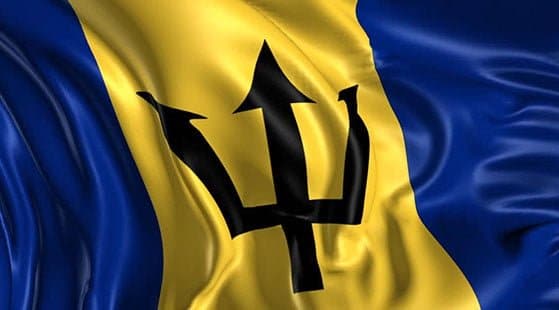

Flag of Barbados.
Symbols of the sea god
Ancient depictions show Poseidon as a stout man in his prime. He has many symbols. One of them I have already mentioned is the trident. It is a kind of weapon and the embodiment of the power of the deity. Poseidon used the trident to fight enemies, to cut water springs from lifeless rocks and to control the elements.
No less famous symbols of Poseidon are his animals. Among them we must distinguish the bull and the horse. The first was considered the embodiment of the energy of the seas, and as a sacrifice to the deity brought black bulls, which can also be seen in images of the ruler of the oceans.
Horses are also often present in myths where Poseidon figures. Researchers believe that this is an archaic image combined with a new interpretation of the god as a sea lord. Legends tell us that Poseidon rides the waves on a shining chariot pulled by swift-footed horses. Also associated with the horse is the legend of Pegasus. Poseidon created this winged beauty from the blood of the slain Medusa Gorgon.
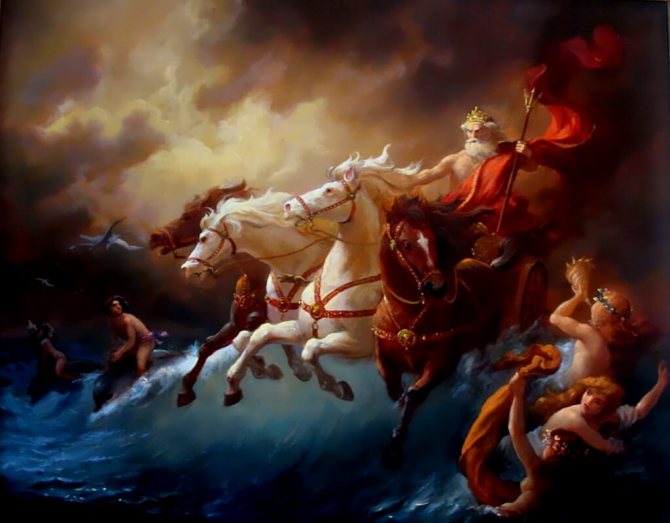

The Greeks pictured Poseidon in a huge horse-drawn chariot.
№6. Poseidon was extremely amorous.
Poseidon had many sexual relationships. He often found his love rejected and then asserted himself by dominating women with violence and guile. As a result, in some sources there are at least 30 relationships of Poseidon with nymphs, goddesses and mortals. Poseidon's most famous sexual relationships include Amphitrite, his wife, who was the goddess of the sea; Gaia, the earth goddess; Tairo, a mortal woman; Alopa, his own granddaughter; Amymone, the daughter of King Libya, whom Poseidon once saved; Saenius, daughter of Atrax, who was raped by Poseidon and later turned into a man at her request; and Medusa, priestess of Athena, who was also raped by Poseidon. In addition to these women, Poseidon had three male lovers: Nerites, Pelops, and Patroclus.
The service of the dolphin.
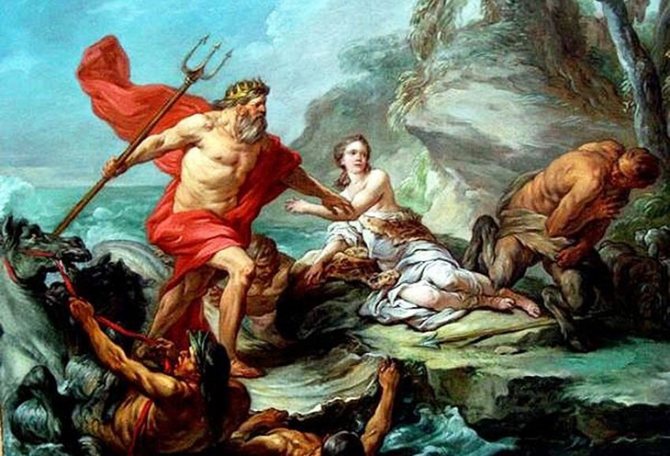

Poseidon's legitimate spouses are called Amphitrite, Beroea, Livia, and Capliro. But besides them he had many lovers. And he did not always win the affections of women honestly, sometimes he took the form of animals to get his own.
The oldest official wife of Poseidon was Amphitrite, the most beautiful daughter of Nereus and Dorida, the sea goddess. The young beauty was windy and cheerful, she did not want to marry and live in submission to her overbearing husband, she dreamed only of having fun and playing with her friends on the sea.
One of her favorite pastimes was dancing, and often she and her nereid sisters would go ashore on moonlit nights and dance. And one such night on the coast of the island of Naxos and saw her Poseidon in a white bedspread and with black hair loose.
Poseidon was seized by a mad passion, and he at once sent matchmakers to the old Nereus, the father of the beauty. He gave his consent to the marriage, he was flattered to become related to the Lord of the Seas himself.
№7. He spawned many gods, demigods and other beings.
As a result of his many relationships with women, Poseidon became the father of many children. Many of them were by mortal women, most of whom have remained unknown. Among Poseidon's most prominent children are Triton, his son by Amphitrite, who was a sea messenger; Atlas, his son by the mortal woman Cleito, who became the first king of Atlantis; Polyphemus, his giant son with the nymph Fusa; Aiolos, his son with Arne, who became the god of winds; Lelex, his son from Libya and the first king of southern Greece; Pegasus, the mythical winged divine stallion who was his descendant from Medusa; Orion, his son with Euryale, who became a giant hunter; and Arion, the divinely bred, extremely fast immortal horse who was his descendant from Demeter.
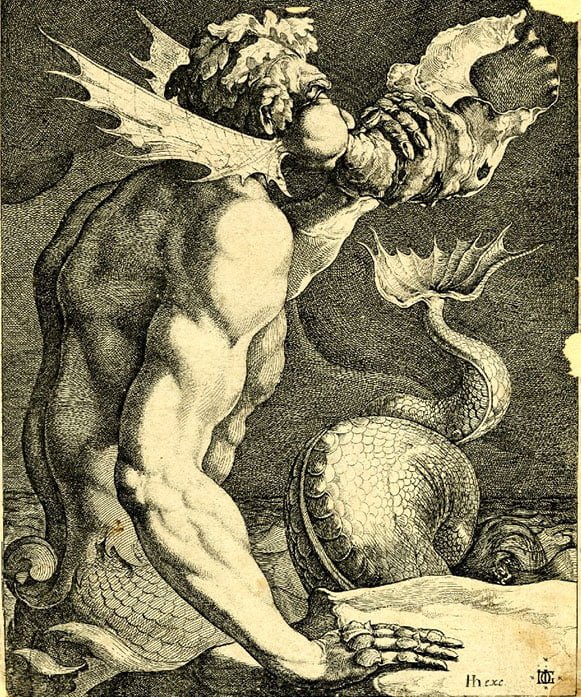

Triton, son of Poseidon
Tritons
Tritons and tritonids are the sons and daughters of Poseidon (Neptune) and Amphitrite. They have a human torso and a fish's bifurcated tail. Tritons are depicted sitting on blue horses with claws instead of hooves. Contemporary works of art often depict tritons blowing into large seashells.
Tritonids are sometimes confused with sirens, other mythological creatures that personified the deceptiveness of the sea water. Sirens and tritonids have a female torso, but in the former it ends in a bird's tail, and in the latter it ends in a fish's tail.
№8. Poseidon appears in the famous epic Iliad.
Poseidon appears in Homer's great epic called the Iliad. As punishment for rebelling against him, Zeus sends Poseidon and his son Apollo to work as slaves for Laomedonus of Troy for a year. After the end of the year, however, Laomedon refuses to pay them for their work in building impenetrable walls around Troy. Consequently, when the Trojan War occurs, Poseidon sides with the Greeks against the Trojans even though Zeus forbids him to interfere. When Zeus learns of this, he sends Apollo to help Troy. As the gods continue to take part in the war, Zeus eventually allows them to do so. Poseidon helps the Greeks in various ways. For example, when the Greek soldiers lacked morale, Poseidon indirectly encourages the troops by disguising himself as an old seer named Calchas. He also saves the Greek hero Achilles from drowning in the river Xanthos.
Neptune is ...
Neptune, on the other hand, is an ancient Roman god and was originally a god of flowing waters. After some time his cult was identified with the cult of Poseidon. Among other things, Neptune was considered the patron saint of horses and chariot races. On July 23 Neptune was celebrated as the feast of Neptunalia. As Neptune was originally worshipped as a god of flowing water, he was primarily expected to protect them from droughts, and only after his identification with Poseidon, did they begin to ask for patronage in the sea.
A couple of accurate quotes.
Historical Dictionary
Neptune is a deity associated with water in the myths of the ancient Romans, which led to his identification with Poseidon. In honor of Neptune was celebrated on July 23 - Neptunalia - in order to prevent drought. Sea Neptune was revered by people associated with the sea or going on a sea voyage, sometimes with deities - personifications of storms, winds, good weather, and doldrums.
Historical Dictionary. 2000
Dictionary of Ancient Greece and Rome, on mythology
NEPTUNE - Roman god of water, later identified with the Greek sea god Poseidon. Identifying Neptune with Poseidon, the Romans attributed the same attributes to him: a trident and a shell-shaped chariot pulled by seahorses. On July 23rd, Neptunalia was celebrated as a festival of Neptune, when leaf huts were built everywhere (with the aim of preventing drought). In antiquity, Neptune was often depicted in mosaics and bas-reliefs; in the Middle Ages, Neptune was a popular carnival character. During the Renaissance, the figure of Neptune was commonly adorned in fountains, the most famous of which are the fountain in Bologna by Giovanni, in Florence by Ammannati, and the fountain by Bernini in Rome; the latter's sculpture, Neptune and Triton, is one of the decorations of the Victoria and Albert Museum collection in London.
Dictionary of Ancient Greece and Rome and Mythology. 2014
Based on the above, given that the external features of Poseidon and Neptune are virtually identical, we will combine their descriptions into one.
№9. Poseidon is the main divine antagonist in Homer's Odyssey.
Poseidon also appears in Homer's other great epic, the Odyssey. Odysseus, the protagonist of the Odyssey, fights at Troy, but finds it difficult to return home to his wife and son. On his way home, Odysseus encounters Cyclops Polyphemus, son of Poseidon. To escape him, Odysseus blinds Polyphemus, and this enrages Poseidon. Thus Poseidon disrupts Odysseus' voyage to his home with storms, leading to the complete destruction of his ship and companions and a ten-year delay. Poseidon is thus the primary divine antagonist in Homer's Odyssey. Despite the many obstacles in his path, Odysseus is eventually able to reach his home. Ironically, the sea phaeacs who help him achieve this have Poseidon as their patron deity.
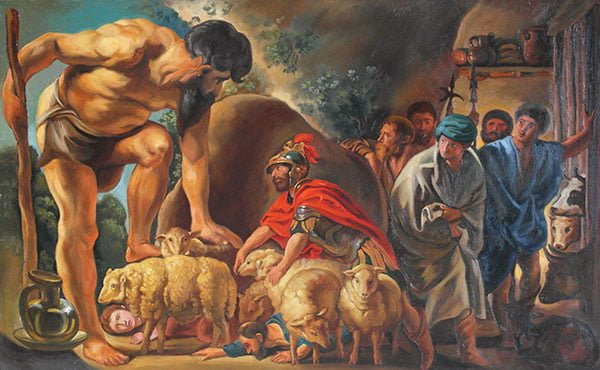

Odysseus in the cave of Polyphemus, painting by Jacob Jordaens
Poseidon is one who does not suffer defeat.
Poseidon demonstrates his stern character with the male members of the gods. He is the only one who opposes the return of Odysseus to his native land, for the hero has blinded Polyphemus.
Homer in his "Odyssey" makes it clear: even Zeus could not assume that his brother would go against the other deities. But Poseidon was adamant, and Odysseus had to wander the seas for many years.
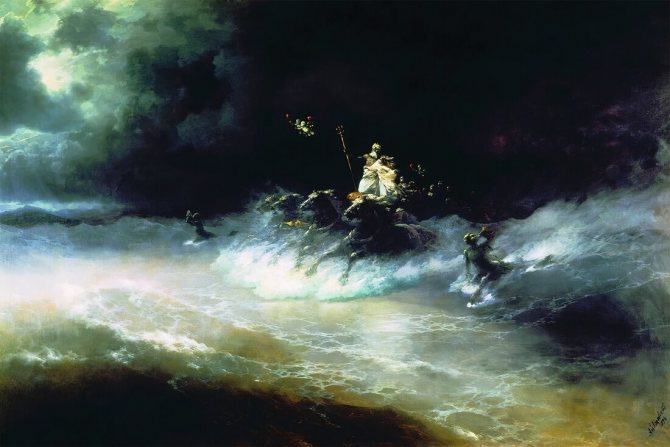

Ivan Konstantinovich Aivazovsky "Poseidon's Journey on the Sea", 1894 Location: Feodosia Aivazovsky Art Gallery, Feodosia, Russia
Poseidon almost always emerges victorious from confrontations, but an exception is known. In a dispute with Athena for the right to become the patron of Attica, Poseidon suffers a defeat (he offered the people a source of salt water, and his rival gave them an olive tree).
Despite the fact that the trial was fair, the formidable god hated the people of Attica. First he nearly flooded their land, after which he destroyed their crops with a great drought. Although I have encountered a version of the myth that Zeus forbade his brother to avenge his defeat.
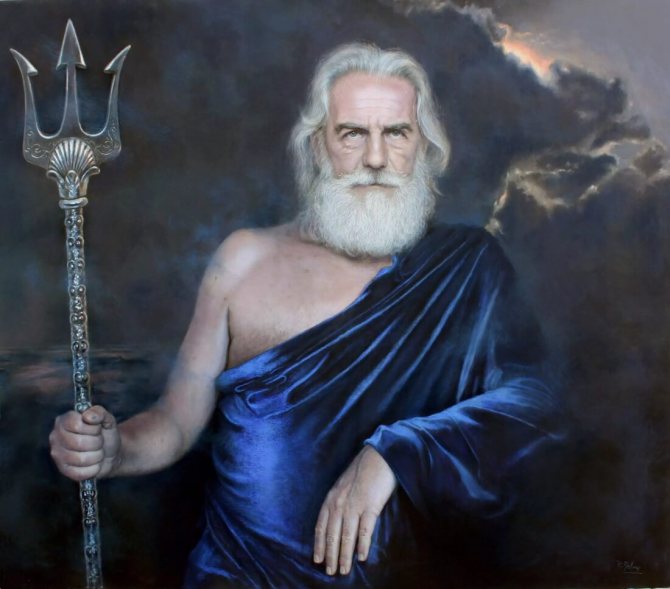

Realistic Poseidon by Spanish artist Ruben Belloso Adorna, 2012
You might call Poseidon a harsh and cruel god, but you have to admit there's something appealing about his power and unpredictable temperament. Probably because since ancient times Poseidon has been associated with the sea, its mysteries and unsolved riddles. Angry or favoring, the lord of the oceans himself seems as strange and incomprehensible as the boundless waves he rules.
№10. Poseidon has been portrayed many times in literature, art, and film.
In addition to The Iliad and The Odyssey, Poseidon appears in many other works, including The Olympic Ode by the ancient Greek lyric poet Pindar; Orestes, an ancient Greek play by Euripides; and Metamorphoses, a major opus by the Roman poet Ovid. In art, statues of Poseidon can be seen in several places, including Gothenburg, Sweden; Copenhagen, Denmark; Bristol, England; and Prešov, Slovakia. In contemporary popular culture, Poseidon is depicted as the father of the protagonist Percy Jackson in the popular pentalogy of fantasy adventure novels, Percy Jackson and the Olympians, by American author Rick Riordan. Poseidon is also the father of a villainous sea witch named Ursula, who appears in the Walt Disney Pictures feature film The Little Mermaid (1989).
Dolphins and the sea lord
The dolphin is an animal dedicated to the god of the seas. He rendered great service to Poseidon (Neptune), for which he received a special role in ancient mythology. Poseidon once fell in love with one of the Nereids - the beautiful Amphitrite - and wanted to catch her, but did not succeed. Amphitrite found refuge in the palace of Oceanus. It was Dolphin who showed Poseidon (Neptune) the place where the palace was. The Olympic god was able to kidnap his beloved: Amphitrite became the ruler of the waters of the sea and the wife of Poseidon (Neptune). Many monuments of ancient and modern art are decorated with images of dolphins. These animals are the indispensable companions in the entourage of Aphrodite and Amphitrite.
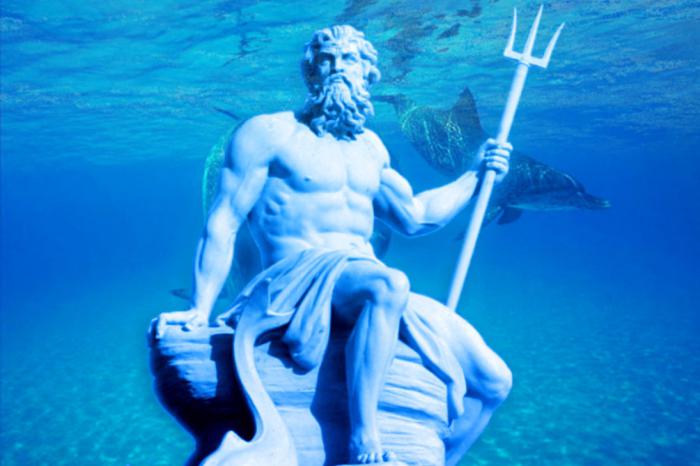

The meaning of the tattoo for girls
The image of Poseidon encapsulates a lot of male energy, so it is less common for girls. The tattoo is suitable for a lady with an "iron" character. It possesses toughness, which helps in building a successful career. God of the sea endows the owner with sexuality and seductiveness. Such a girl is amorous and knows what she wants from life.
The meaning of tattoos for men
Tattoo of Poseidon can be found in overbearing men with pronounced leadership qualities. They are used to give orders and command, to achieve goals. Figure of the god of the seas endows the owner with willpower and assertiveness. These guys are attractive and popular with the girls. They are very amorous, but having met his "soul mate" abandon their pranks.
